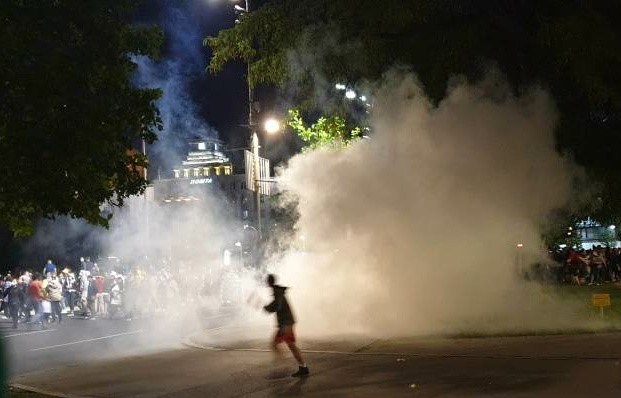Demonstrators outside the Serbian parliament were met by tear gas by the police yesterday night when protesting against the government’s decision to impose a curfew in Belgrade next weekend.
The decision follows a surge in the number of new infections after lifting the previous lockdown restrictions in the country when president Alexandar Vucic declared a state of emergency. In his speech to the nation this time, Serbian president Alexandar Vucic warned that the hospitals risk being overwhelmed by the surge in new infections.
According to last week’s risk assessment (annex 1) by the European Centre for Disease Prevention and Control (ECDC), the 14- day incidence rate (moving average) of reported cases per 100.000 inhabitants is increasing in all Western Balkans countries. The situation in Serbia, however, was confounded by the parliamentary elections that were held on 21 July.
The governing coalition headed by president Vucic received close to 62 % of the votes. Voter turnout was just over 50 % after the major opposition parties boycotted the elections.
Instead of using the time to put in place an effective testing and contact tracing organisation, rallies and other events were allowed to take place without any precautions during the election campaign. As in other countries, where lockdown restrictions were lifted prematurely or without proper planning, trust in the government is eroding and people resist a new lockdown or, as in Belgrade, a curfew.
Srebrenica remembrance
President Vucic needs also to regain the trust of the European Commission in the EU-facilitated dialogue between Belgrade and Pristina. After a break since 2018, the dialogue is planned to be relaunched in Brussels on 12 July. On Friday, a virtual mini-summit organised by France and Germany is also planned.
The relaunch of the dialogue coincides with the 25th anniversary of the Srebrenica genocide which will be officially commemorated on 11 July. At a digital conference yesterday marking the remembrance, enlargement commissioner Oliver Varhelyi said that the Srebrenica genocide was the most tragic event perpetrated on the European soil since the Second World War.
“It’s still an open wound at the heart of Europe. It continues to haunt us and reminds us of our shared responsibility to prevent genocide from ever happening again,” he underlined. The massacre was recognised as an act of genocide by international courts but Serbia was not seen as directly responsible for the Bosnian Serb forces operating in the UN “safe area” of Srebrenica.
Participants in the Commission’s conference remarked that the prevailing mood in the countries involved in the war in Bosnia-Herzegovina in the 90-ies is dominated by nationalistic narratives that prevent them from coming to terms with the past and engaging in a true reconciliation process, a condition for them to join the EU.
Without mentioning Serbia’s role during the war, Varhelyi said that “Srebrenica calls for accountability. Justice must be served, and all those responsible for the massacre must face the consequences of their actions. 25 years on, it is more urgent than ever to end impunity for the perpetrators of war crimes.”
Update: Following a second night of alleged police brutality in Belgrade, the spokespersons of the European Commission said at today’s press conference (9 July) that the situation there raised concerns and defended the right to peaceful protests. They declined to assess Serbia’s measures to handle the coronavirus crisis.
As regards the relaunch of the Belgrade-Pristina dialogue on Sunday, they expected that it would not be a one-off event but the start of a process which will result in normalisation between Serbia and Kosovo. As normalisation is also a condition for EU membership, the dialogue should also meet the expectations of their peoples to join the EU.
M. Apelblat
The Brussels Times

